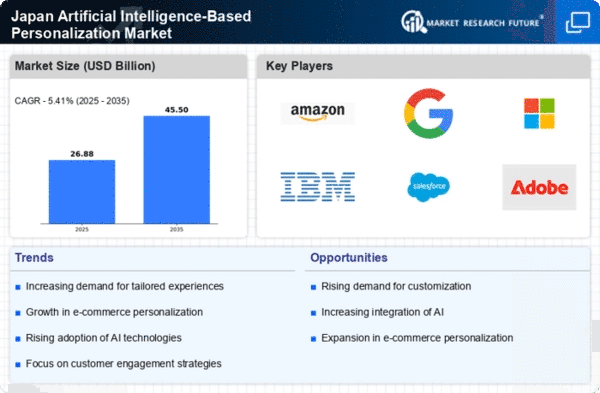Consumer Behavior Shifts
Changing consumer preferences in Japan are significantly influencing the artificial intelligence-based-personalization market. As consumers become more accustomed to personalized experiences, they increasingly expect brands to cater to their individual needs. Recent surveys indicate that approximately 70% of Japanese consumers prefer brands that offer personalized recommendations. This shift in behavior compels businesses to invest in AI technologies that can analyze consumer data and deliver tailored content. The ability to provide personalized experiences not only enhances customer loyalty but also drives sales growth. Consequently, companies that fail to adapt to these changing expectations may find themselves at a competitive disadvantage. The artificial intelligence-based-personalization market is thus poised for growth as businesses strive to meet the evolving demands of their customers.
Technological Advancements in AI
The rapid evolution of artificial intelligence technologies is a primary driver for the artificial intelligence-based-personalization market. In Japan, advancements in machine learning algorithms and natural language processing are enabling businesses to create more tailored experiences for consumers. For instance, the integration of AI in customer service applications has shown to enhance user satisfaction by up to 30%. This technological progress allows companies to analyze vast amounts of data efficiently, leading to improved decision-making processes. As organizations increasingly adopt AI-driven solutions, the demand for personalized services is expected to grow, potentially increasing market revenue significantly. The artificial intelligence-based-personalization market is likely to benefit from these innovations, as they facilitate the development of more sophisticated personalization strategies.
Expansion of E-commerce Platforms
The growth of e-commerce platforms in Japan is a significant driver for the artificial intelligence-based-personalization market. As online shopping continues to gain traction, businesses are increasingly leveraging AI to enhance the customer experience. E-commerce companies are utilizing AI algorithms to analyze consumer behavior and preferences, allowing for personalized product recommendations. Reports indicate that personalized marketing can lead to conversion rates that are 5 to 10 times higher than traditional methods. This trend suggests that the artificial intelligence-based-personalization market will expand as e-commerce platforms seek to differentiate themselves in a competitive landscape. The integration of AI into these platforms not only improves customer engagement but also drives sales, indicating a promising outlook for the market.
Increased Investment in AI Startups
The influx of investment in AI startups within Japan is a notable driver for the artificial intelligence-based-personalization market. Venture capital funding for AI-related companies has surged, with investments reaching over ¥100 billion in recent years. This financial support enables startups to innovate and develop cutting-edge personalization technologies. As these companies emerge, they contribute to a more dynamic market landscape, fostering competition and driving advancements in AI capabilities. The growth of AI startups not only enhances the technological foundation of the artificial intelligence-based-personalization market but also encourages established companies to adopt new solutions. This trend suggests a robust future for personalization technologies as more players enter the market, potentially leading to a wider array of personalized offerings for consumers.
Regulatory Environment and Compliance
The regulatory landscape in Japan is evolving, impacting the artificial intelligence-based-personalization market. With increasing scrutiny on data privacy and ethical AI use, businesses must navigate complex regulations to ensure compliance. The Japanese government has implemented guidelines that promote responsible AI practices, which could influence how companies approach personalization. Organizations that prioritize compliance may gain a competitive edge, as consumers are becoming more aware of data privacy issues. This focus on ethical AI use is likely to shape the strategies employed by businesses in the artificial intelligence-based-personalization market, encouraging them to adopt transparent practices. As a result, companies that align their operations with regulatory expectations may enhance their reputation and foster consumer trust.
















